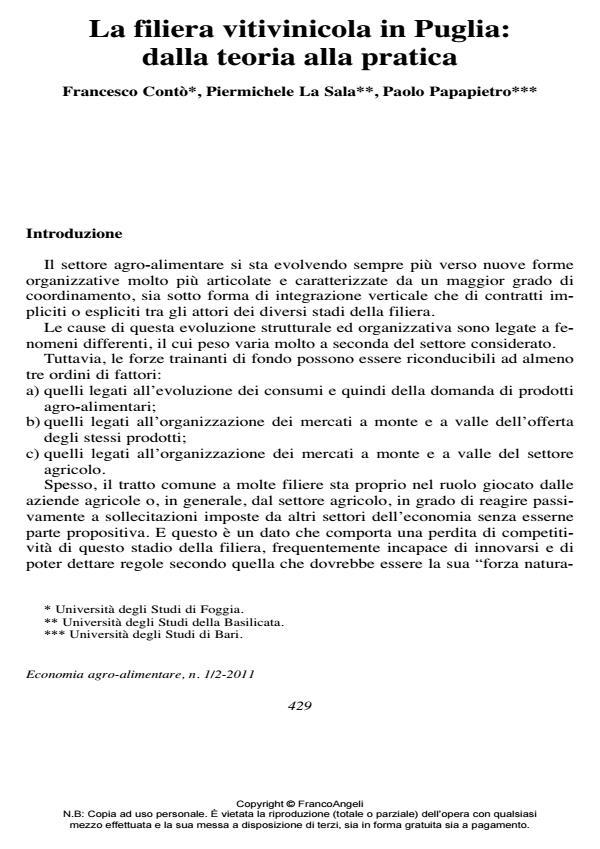La filiera vitivinicola in Puglia: dalla teoria alla pratica
Titolo Rivista ECONOMIA AGRO-ALIMENTARE
Autori/Curatori Francesco Contò, Piermichele La Sala, Paolo Papapietro
Anno di pubblicazione 2011 Fascicolo 2011/1-2
Lingua Italiano Numero pagine 37 P. 429-465 Dimensione file 324 KB
DOI 10.3280/ECAG2011-001019
Il DOI è il codice a barre della proprietà intellettuale: per saperne di più
clicca qui
Qui sotto puoi vedere in anteprima la prima pagina di questo articolo.
Se questo articolo ti interessa, lo puoi acquistare (e scaricare in formato pdf) seguendo le facili indicazioni per acquistare il download credit. Acquista Download Credits per scaricare questo Articolo in formato PDF

FrancoAngeli è membro della Publishers International Linking Association, Inc (PILA), associazione indipendente e non profit per facilitare (attraverso i servizi tecnologici implementati da CrossRef.org) l’accesso degli studiosi ai contenuti digitali nelle pubblicazioni professionali e scientifiche.
The food industry is evolving more towards new forms of organization much more complex and characterized by a greater degree of coordination, whether in the form of vertical integration of explicit or implicit contract between players of different levels of the industry. The causes of this structural and organizational changes are related to different phenomena, whose weight varies greatly depending on the chain. However, the underlying driving forces may be due to at least three factors: a) those related to changing consumption and therefore demand for food and agricultural products; b) those related to the organization of the markets upstream and downstream supply the same products; c) those related to the organization of the markets upstream and downstream of the agricultural sector. Often, the common feature in many food chains lies in the role played by farmers or, in general, the agricultural sector, capable of reacting passively to stress imposed by other sectors of the economy without being proactive. And this is something that causes a loss of competitiveness of this stage of the process, frequently unable to innovate and to lay down rules according to what should be his "natural force" against an organization of chain which is the engine: an agricultural world incapable, that is, to be the protagonist in exchange relations, important for survival in a market economy. Therefore, the aim of this work is the search for mechanisms that can provide value to the production phase to push on bitter increases competitiveness of the sector. In reaching this result was useful from the pipeline concept as developed agrarian economy to analyze how this has been the subject of theoretical developments and how these developments have come to define, through the actions of the agricultural policy - particularly in relation to the development of Integrated Projects of Food Chain introduced by the Rural Development Program 2007-2013 of the Regions - a model basically in line with what happens in practice. For the first time, in fact, discussing food chains having as reference a recognized legal entity, formed to develop projects and develop the Integrated Projects of food Chain. The objective of this research work has been pursued with particular reference to a sector - agriculture - and to a food chain - wine - in a given territory - the Apulia region - is evolving proving, partly as a result of actions of agricultural policy at Community, national and regional level, significant levels of economic growth and development. About the methodology, using the administration of questionnaires to sample the three companies participating in food chain partnerships that have proposed a draft of integrated design of food chain in response to the notice of the Apulia Region for the submission of the Integrated Projects of food Chain, it was possible to define characteristics and develop the swot analysis of Apulian wine food chain and, consequently, identify the mechanisms that regulate the relations of the food chain and with the help of network analysis, to assess the weight of relations between individuals of the same.
Parole chiave:Apulian wine food chain, rural development, integrated project of food chain
Jel codes:Q10, Q18, Q13
Francesco Contò, Piermichele La Sala, Paolo Papapietro, La filiera vitivinicola in Puglia: dalla teoria alla pratica in "ECONOMIA AGRO-ALIMENTARE" 1-2/2011, pp 429-465, DOI: 10.3280/ECAG2011-001019